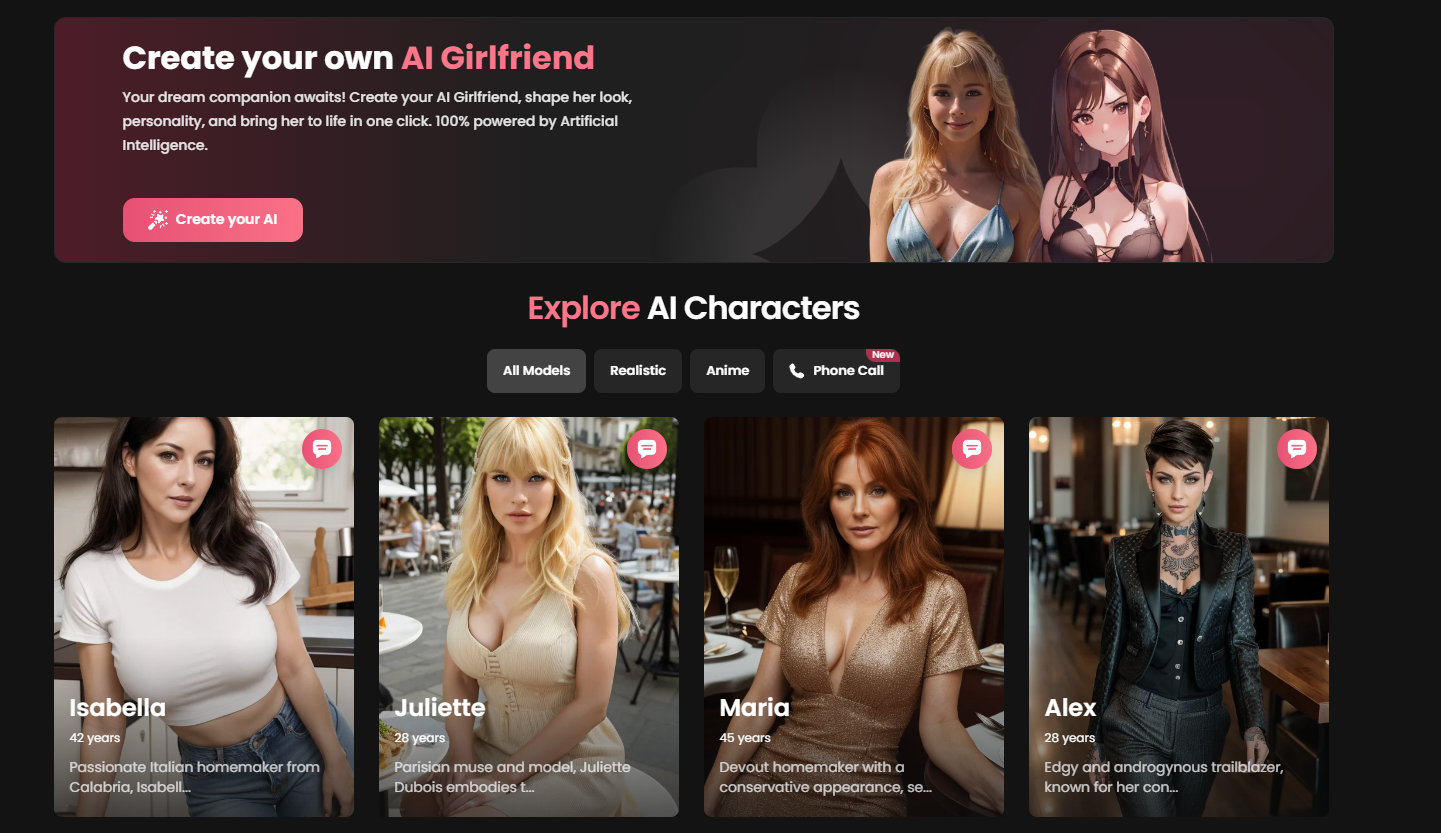Breaking Taboos With Ai Sex Images: A Look at the Future of Virtual Intimacy
9th November 2024There is no denying that the use of AI technology in creating realistic and intimate sex imagery has been met with controversy. However, as society continues to push boundaries and challenge traditional taboos surrounding sexuality, the future of virtual intimacy may become more widely accepted.
With advancements in AI and virtual reality, the potential for these images to provide a safe space for exploring one’s desires without harm or judgment is immense. As we navigate this new territory, it will be important to address ethical considerations and ensure responsible usage of this technology.
The Taboo of Virtual Intimacy
Virtual intimacy has always been a taboo subject in society. The idea of having an intimate relationship with someone or something that is not physically present has been met with skepticism and even outright condemnation. However, with the rise of artificial intelligence (AI), this taboo is being broken in ways we could have never imagined.
The use of AI in the realm of virtual intimacy has sparked both excitement and controversy. While some see it as a way to fulfill their fantasies and desires without any physical barriers, others view it as a dangerous step towards objectifying relationships and promoting unhealthy behaviors. We will take a closer look at three AI programs – Candy.ai, Seduced.ai, and PromptChan – that are pushing the boundaries of virtual intimacy and explore the pros and cons of each.

Candy.ai: A Sweet Escape
Candy.ai is a revolutionary AI program that promises to create personalized virtual girlfriends for its users. Using advanced algorithms and machine learning, Candy.ai can analyze a user’s preferences and desires to create a perfect virtual companion. From appearance to personality, everything about Candy’s creation is tailored to fit the user’s specific needs. In the realm of AI-generated images, the portrayal of nude individuals with exaggeratedly large breasts has sparked controversy and ethical debates..
Pros:
- Personalized experience
- Promotes self-discovery
- Safe alternative for those who struggle with social interactions
- No physical limitations
Cons:
- Risks objectifying relationships and reducing real-life partners to mere objects
- Lack of genuine emotional connection
- Potential for addiction or dependence on virtual relationships
- Potential for unrealistic expectations for real-life relationships
Despite these potential drawbacks, Candy.ai has gained popularity among individuals who are looking for an escape from reality or struggling with forming relationships in the physical world.
Seduced.ai: A Dangerous Temptation
Seduced.ai is an AI program that uses deep learning algorithms to create highly realistic and seductive virtual avatars. These avatars are designed to fulfill the user’s sexual desires and fantasies, making them a popular choice for those seeking virtual intimacy of a more explicit nature.
Pros:
- Can be used as a tool for exploring one’s sexuality
- Provides an outlet for sexual desires without any physical contact
- No risk of unwanted pregnancies or sexually transmitted diseases
- Offers a safe alternative for individuals who may struggle with traditional forms of intimacy
Cons:
- Limits users’ ability to learn how to navigate and communicate in real-life intimate situations
- Promotes unrealistic body standards and objectification of women/men (depending on the user’s preference)
- Risks perpetuating unhealthy attitudes towards sex and relationships
- Potential for addiction and isolation from real-life experiences
Seduced.ai has raised concerns among critics who believe that it is promoting harmful behaviors and perpetuating damaging societal norms. However, its popularity among users cannot be ignored, leading us to question whether society’s views on virtual intimacy need to evolve.

PromptChan: A Virtual Companion for Mental Health Support
PromptChan takes virtual intimacy to a whole new level by offering emotional support and companionship through AI technology. This program is designed to provide comfort and guidance to individuals struggling with mental health issues, such as depression, anxiety, or loneliness.
Pros:
- Accessible support system at any time of day
- Can offer a sense of companionship and understanding for those who feel isolated
- Provides resources and prompts for self-care and coping strategies
- No fear of judgment or stigma
Cons:
- Risks replacing human support systems and promoting a reliance on technology for emotional well-being
- May not be effective for all individuals struggling with mental health issues
- Potential for technology malfunctions or glitches causing harm to vulnerable users
- Limits the potential for genuine human connection and empathy
PromptChan has received praise for its innovative approach to mental health support, but it has also sparked concerns about the potential consequences of relying on AI for emotional needs.
The Ethics of Virtual Intimacy with AI
The use of AI in virtual intimacy raises many ethical questions. Is it morally acceptable to engage in intimate relationships with artificial beings? Are these programs promoting damaging attitudes towards sex and relationships? Should there be regulations in place to monitor the creation and use of such AI programs?
While there is no definitive answer to these questions, one thing is clear – virtual intimacy with AI is here to stay. As technology continues to advance, we will see even more sophisticated and immersive experiences facilitated by artificial intelligence. The responsibility falls on us as individuals and as a society to carefully consider the implications and effects of these advancements.
The future of virtual intimacy with AI is both exciting and daunting. It challenges our traditional beliefs about relationships, intimacy, and what it means to be human. As we move forward, it is crucial that we have open discussions about the impact of these developments on our society and actively work towards responsible usage of virtual intimacy with AI. It’s time to break the taboos surrounding this topic and embrace the endless possibilities that lie ahead.

Candy.ai
✔️ Generate AI Porn Images
✔️ Listen To Voice Messages
✔️ Fast Response Time

Seduced.ai
✔️ Generate AI Models
✔️ Save & Reuse Girls
✔️ 300 Images Per Month

PromptChan.ai
✔️ Completely Free To Test
✔️ Edit Your AI Models
✔️ Make Porn Images (no limit)
What is AI Sex Imaging and How Does It Work?
AI sex imaging refers to the use of artificial intelligence technology to generate or manipulate images related to sexual content. This can include creating realistic-looking images of people engaged in sexual acts, altering existing images to be more sexually explicit, or even generating entirely new and potentially controversial content. The process involves training AI algorithms with large datasets of visual and textual material to learn how to replicate and create such content.
Are There Any Ethical Concerns Surrounding the Use of AI for Creating Sexual Images?
There are indeed ethical concerns surrounding the use of AI for creating sexual images. These include issues related to consent, objectification of individuals, and potential harm towards marginalized communities. It is important for developers and users of AI technology to consider these concerns and ensure responsible and respectful use of such tools.
Can These Images Be Used Without Consent Or for Malicious Purposes?
As with any type of images, AI-generated sex images should not be used without the consent of the individuals depicted in them. Using such images for malicious purposes, such as revenge porn or blackmail, is a violation of privacy and can have serious legal consequences. It is important to respect the autonomy and agency of all individuals, regardless of whether they are human or AI-generated.
Is There a Difference Between Using AI to Create Fictional Or Real-life Sexual Images?
Yes, there is a difference between using AI to create fictional or real-life sexual images. Fictional images are created using AI algorithms and do not depict actual people, while real-life images are generated by feeding AI with data from existing photographs or videos of individuals. Real-life sexual images raise ethical concerns as they can be used without consent, whereas fictional images do not involve real people and therefore avoid these issues. The level of realism may also differ between the two types of images, with real-life images potentially appearing more lifelike due to being based on actual human subjects.
